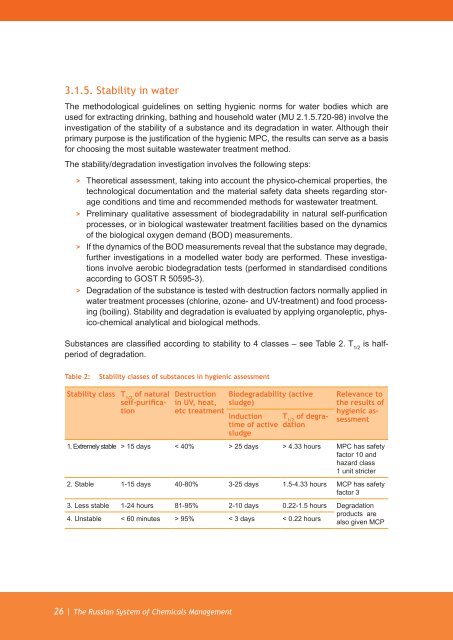The Russian system of chemicals management - Bef-de.org
The Russian system of chemicals management - Bef-de.org
The Russian system of chemicals management - Bef-de.org
You also want an ePaper? Increase the reach of your titles
YUMPU automatically turns print PDFs into web optimized ePapers that Google loves.
3.1.5. Stability in water<br />
<strong>The</strong> methodological gui<strong>de</strong>lines on setting hygienic norms for water bodies which are<br />
used for extracting drinking, bathing and household water (МU 2.1.5.720-98) involve the<br />
investigation <strong>of</strong> the stability <strong>of</strong> a substance and its <strong>de</strong>gradation in water. Although their<br />
primary purpose is the justification <strong>of</strong> the hygienic MPC, the results can serve as a basis<br />
for choosing the most suitable wastewater treatment method.<br />
<strong>The</strong> stability/<strong>de</strong>gradation investigation involves the following steps:<br />
>> <strong>The</strong>oretical assessment, taking into account the physico-chemical properties, the<br />
technological documentation and the material safety data sheets regarding storage<br />
conditions and time and recommen<strong>de</strong>d methods for wastewater treatment.<br />
>> Preliminary qualitative assessment <strong>of</strong> bio<strong>de</strong>gradability in natural self-purification<br />
processes, or in biological wastewater treatment facilities based on the dynamics<br />
<strong>of</strong> the biological oxygen <strong>de</strong>mand (BOD) measurements.<br />
>> If the dynamics <strong>of</strong> the BOD measurements reveal that the substance may <strong>de</strong>gra<strong>de</strong>,<br />
further investigations in a mo<strong>de</strong>lled water body are performed. <strong>The</strong>se investigations<br />
involve aerobic bio<strong>de</strong>gradation tests (performed in standardised conditions<br />
according to GOST R 50595-3).<br />
>> Degradation <strong>of</strong> the substance is tested with <strong>de</strong>struction factors normally applied in<br />
water treatment processes (chlorine, ozone- and UV-treatment) and food processing<br />
(boiling). Stability and <strong>de</strong>gradation is evaluated by applying <strong>org</strong>anoleptic, physico-chemical<br />
analytical and biological methods.<br />
Substances are classified according to stability to 4 classes – see Table 2. Τ 1/2<br />
is halfperiod<br />
<strong>of</strong> <strong>de</strong>gradation.<br />
Table 2:<br />
Stability classes <strong>of</strong> substances in hygienic assessment<br />
Stability class Τ 1/2<br />
<strong>of</strong> natural<br />
self-purification<br />
Destruction<br />
in UV, heat,<br />
etc treatment<br />
Bio<strong>de</strong>gradability (active<br />
sludge)<br />
Induction<br />
time <strong>of</strong> active<br />
sludge<br />
Τ 1/2<br />
<strong>of</strong> <strong>de</strong>gradation<br />
Relevance to<br />
the results <strong>of</strong><br />
hygienic assessment<br />
1. Extremely stable > 15 days < 40% > 25 days > 4.33 hours MPC has safety<br />
factor 10 and<br />
hazard class<br />
1 unit stricter<br />
2. Stable 1-15 days 40-80% 3-25 days 1.5-4.33 hours MCP has safety<br />
factor 3<br />
3. Less stable 1-24 hours 81-95% 2-10 days 0.22-1.5 hours Degradation<br />
4. Unstable < 60 minutes > 95% < 3 days < 0.22 hours<br />
products are<br />
also given MCP<br />
26 | <strong>The</strong> <strong>Russian</strong> System <strong>of</strong> Chemicals Management



